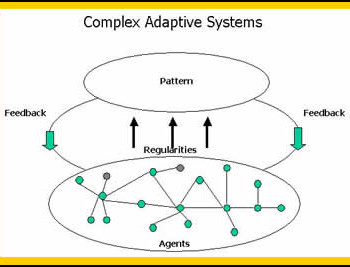Leadership in the knowledge economy
Many of us grew up during the industrial era. Today, we are living in the knowledge economy which is quite distinct therefrom. In the industrial era, we were dealing with complicated systems, systems in which patterns could be predicted and problems could be clearly identified and resolved. In the knowledge economy, we are dealing with complex systems involving diversity, non-linear interdependencies, self-organization, unpredictable patterns, and continual change (McDaniel, 2007). How does this impact leadership?
As this change has taken place, many ways in which organizations have been led and governed have not (Uhl-Bien, Marion, & McKelvey, 2007) kept pace. In the knowledge economy, “the context in which leaders operate is both radically different and diverse” (p. 299) and, therefore, the leadership required is different. Now, leaders do well to observe their organizational systems, be aware of what feedback loops are telling them, and “influence this dynamic and the outcomes” (Uhl-Bien et al., 2007, p. 299) – i.e., put initiatives in place that facilitate the system to move in the relevant direction. In addition, the environment is ever changing so this is an ongoing, continuous requirement.
The command and control style of leadership no longer works. Because complex systems from outside organizations are prevalent and impact them, organizations need to be adaptable in response. This means that leaders do well to become learners, both learning from dynamics in real time and leading from that place of learning. It is also important for them to consider inter-relationships of people and variables and to find ways for people at all levels to learn and innovate.
Adapting is the new way of leadership. Instead of fighting the uphill battle of change, a leader must learn and flex and help others in the organization to do the same. Sustainable success relies on flexibility.
Yours in learning and leadership,
Jamie
Resources
Image retrieved from https://www.pinterest.com/researchnatural/complex-adaptive-systems/
McDaniel, R.R. (2007). Management strategies for complex adaptive systems sensemaking, learning, and improvisation. Performance Improvement Quarterly, 20(2), 21-42.
Uhl-Bien, M., et al. (2007). Complexity leadership theory: Shifting leadership from the industrial age to the knowledge era. The Leadership Quarterly, 18(4), 298-318.

